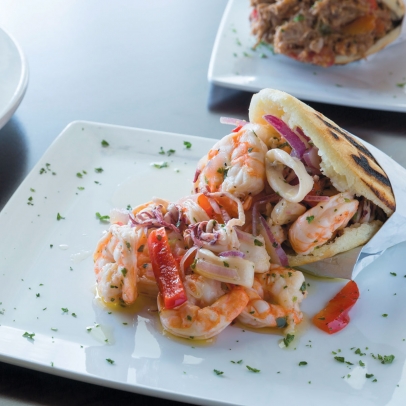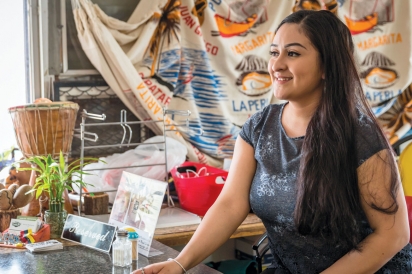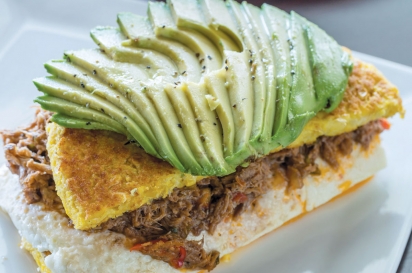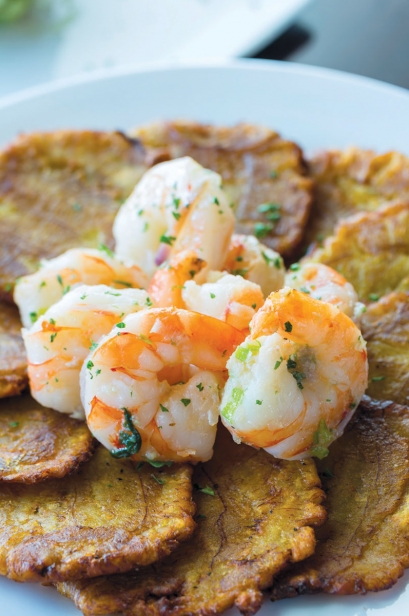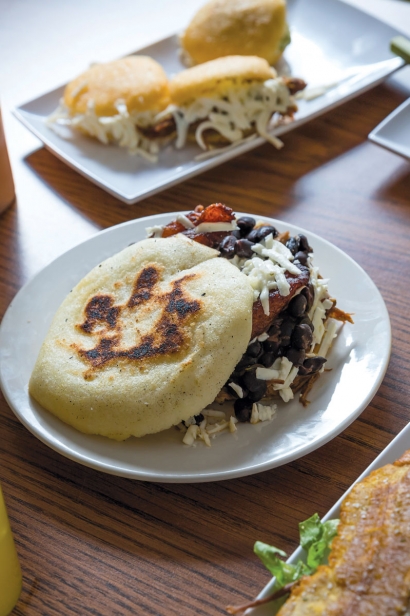The Flavors of Caracas Come to Michigan
Two families, two different journeys, one vision: to bring a taste of Venezuela to southeast Michigan.
Venezuelan cuisine is not as common as Mexican fare around the region, so when El Rey de las Arepas opened in southwest Detroit in November 2014. “We were the first Venezuelan restaurant in Detroit,” says owner Ray Gutierrez. We wanted to show our food to the community, he says.
Just a few months later, in March, husband-and-wife team Christopher Garrido and Vanessa Gonzalez opened Garrido’s Bistro and Pastry in Grosse Pointe Woods. The couple first came to Michigan to visit family in Grosse Pointe Park during the winter of 2014, one of the most brutal in recent memory. But that didn’t faze them; just a few months later they moved to Michigan.
Venezuelan cuisine draws upon many influences, featuring a lot of Caribbean flavors and staples such as rice, beans and plantains as well as proteins such as beef, pork and chicken and fresh vegetables including tomatoes, bell peppers, garlic, green onion, cilantro and avocado.
The cuisine is on the mild side and very flavorful, says Gonzalez, adding “It’s very easy on the palate. Even if you’re not an adventurous eater, this is an easy new food to [try].”
The arepa, similar to a sandwich, is perhaps one of the best-known of Venezuelan dishes. Some of the most popular filling choices include chicken and avocado and shredded beef. Then there’s the national dish, pabellon criollo, which is composed of rice, beans, plantains and slow-cooked shredded beef. For dessert, there’s the beloved quesillo, a type of flan.
The families have different approaches to their restaurants: While Gutierrez is bringing a more traditional interpretation with a bit of street-food flair, Gonzalez and Garrido feature Venezuelan cuisine as well as dishes that reflect a global perspective and their classic French cooking background. Either way, both families are offering a slice of their homeland’s food and culture to metro Detroit.
Although southwest Detroit is known primarily for Mexicantown, it has one of the most diverse communities in Michigan. The large Spanish-speaking community is what drew the Gutierrez family, who live in Livonia, to set up shop first on St. John Street and now on McGraw Avenue just by I-94.
Opening a restaurant was a longtime dream of the Gutierrez family. “Every time we threw a party or went to someone’s house [people would ask] ‘Can you make arepas?’” Gutierrez says.
They didn’t realize their restaurant would instantly make a mark. On the first day they opened, they ran out of food. Gutierrez says that the majority of his customers are not from Detroit. Venezuelans make the trek from Ann Arbor as well as non-Venezuelans from Oakland County and Canada.
Many of the recipes are from Gutierrez’s mother. She was the one who taught Gutierrez, who was a mechanic with no professional cooking experience, how to cook. She still makes an appearance for big catering jobs or if quesillo is on the specials menu.
Gutierrez has put his own spin on the menu as well, developing the other popular dish, the fresh corn cake cachapa, with his aunt’s help. His love of baseball manifests in offerings such as the Double Play Hamburger. Some of his customers include Detroit Tigers, specifically fellow Venezuelans Miguel Cabrera and Francisco Rodriguez.
Over on the east side, classically trained chefs Gonzalez and Garrido are also offering up arepas, cachapas and pabellon criollo, but the eclectic menu doesn’t stop there. There are dishes such as beef stroganoff, a nod to Christopher’s grandfather and grandmother, who came from the Ukraine and Germany to Venezuela after World War II.
On occasional Sundays, Garrido’s will play host to themed dinners that spotlight a different country such as Brazil or Peru; some of the dishes served at these special events become staples on the menu, including Brazilian Shrimp Moqueca Stew and Lomo Saltado.
“We’re Venezuelan and we can definitely bring some great stuff from Venezuela to this community, but we don’t want to limit ourselves to that,” Gonzalez says. “We can do more and keep it interesting and fun.”
Like El Rey de las Arepas, Garrido’s has become a gathering point for other Venezuelans in the area.
“We didn’t know any other Venezuelans, but after we opened, they started coming out,” Gonzalez says, noting they come from Ann Arbor and Novi. And they’ve also built a following among nonVenezuelans who come to Garrido’s looking to get their “arepa fix.”
“In a way we sort of became ambassadors to our culture here,” Gonzalez says. The country’s political and economic turmoil (over the spring, the government cracked down on protesters demonstrating against the president, leaving dozens dead in the clashes) has raised concern among her regulars who come to the restaurant not to eat but to check on the proprietors. “They’re not even coming in for a meal. [They say] ‘Oh, my gosh, Vanessa, I just came to see how’s your family in Venezuela.’ They have embraced us and loved us and we can call them as friends.”
Find out more at El Rey de las Arepas and Garrido’s Bistro and Pastry


